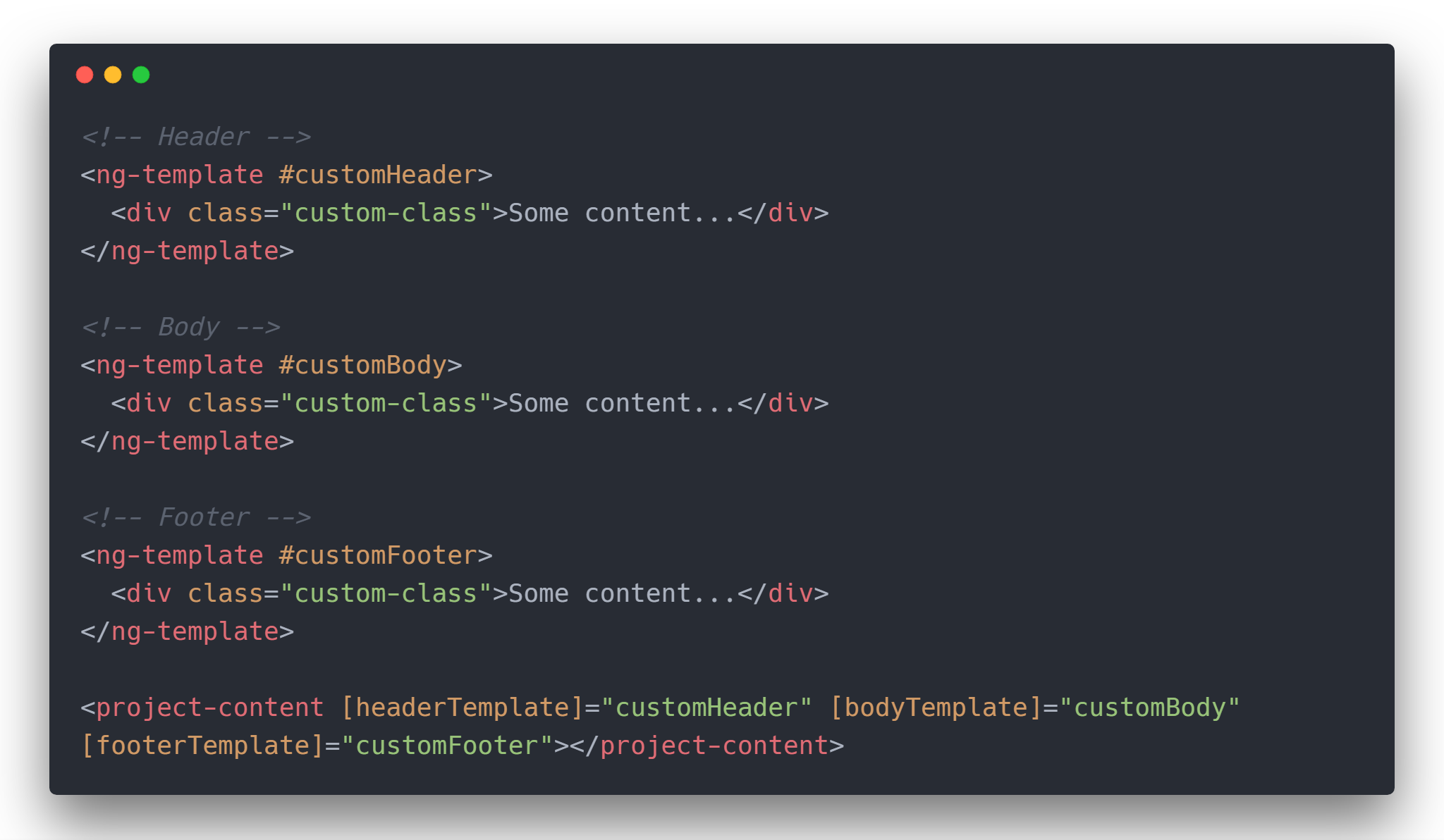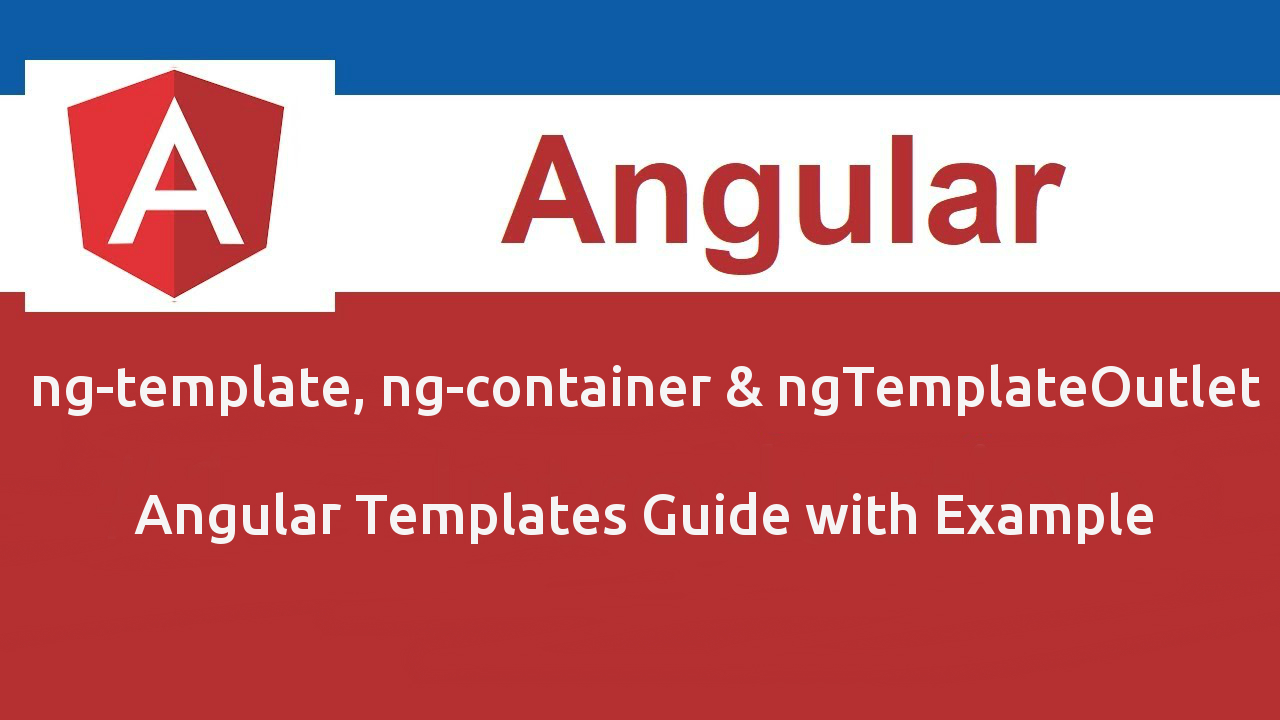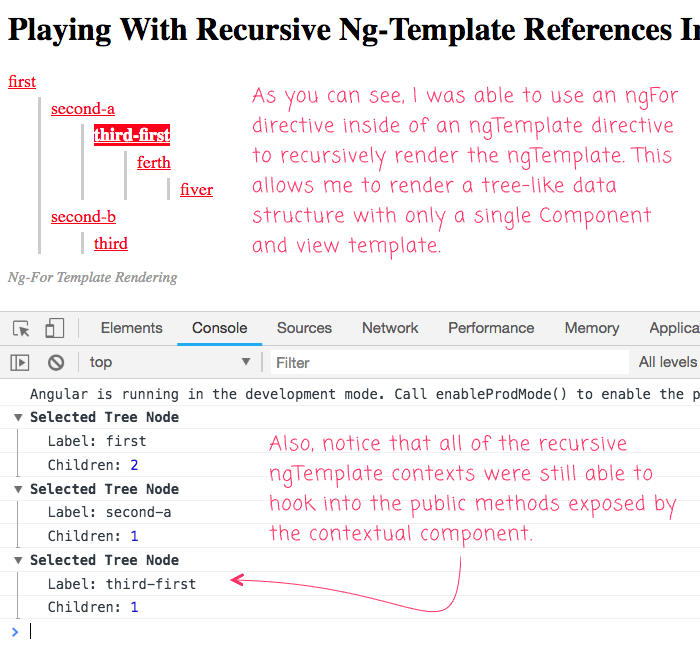Angular Ng Template
Angular Ng Template - I solved it this way: Here we are defining two tab. Whether it really renders html template, we will see with an example. Web one of the main uses for is to hold template content that will be used by structural directives. When using the structural directive shorthand, angular creates an element behind the scenes.</p> We also learn how it works and how angular makes use of them in various directives like ngif, ngfor & ngswitch etc. The method receives a simplechanges object of current and previous property values. Web a structural directive that conditionally includes a template based on the value of an expression coerced to boolean. When the expression evaluates to true, angular renders the template provided in a then clause, and when false or null, angular renders the template provided in an optional else clause. Web 1 probably you have to check the angular lifecycle hooks.
However, it is not rendered directly on dom. Web 1 probably you have to check the angular lifecycle hooks. Web a structural directive that conditionally includes a template based on the value of an expression coerced to boolean. Web one of the main uses for is to hold template content that will be used by structural directives. Whether it really renders html template, we will see with an example. We also learn how it works and how angular makes use of them in various directives like ngif, ngfor & ngswitch etc. Those directives can add and remove copies of the template content based on their own logic. The method receives a simplechanges object of current and previous property values. When using the structural directive shorthand, angular creates an element behind the scenes.</p> When the expression evaluates to true, angular renders the template provided in a then clause, and when false or null, angular renders the template provided in an optional else clause.
When the expression evaluates to true, angular renders the template provided in a then clause, and when false or null, angular renders the template provided in an optional else clause. The method receives a simplechanges object of current and previous property values. I solved it this way: Whether it really renders html template, we will see with an example. Web one of the main uses for is to hold template content that will be used by structural directives. Web 1 probably you have to check the angular lifecycle hooks. When using the structural directive shorthand, angular creates an element behind the scenes.</p> We also learn how it works and how angular makes use of them in various directives like ngif, ngfor & ngswitch etc. However, it is not rendered directly on dom. Web a structural directive that conditionally includes a template based on the value of an expression coerced to boolean.
Playing With Recursive NgTemplate References In Angular 6.1.10 YouTube
We also learn how it works and how angular makes use of them in various directives like ngif, ngfor & ngswitch etc. Web one of the main uses for is to hold template content that will be used by structural directives. Whether it really renders html template, we will see with an example. However, it is not rendered directly on.
Everything you need to know about , , and *ngTemplateOutlet in Angular
Web one of the main uses for is to hold template content that will be used by structural directives. Those directives can add and remove copies of the template content based on their own logic. When the expression evaluates to true, angular renders the template provided in a then clause, and when false or null, angular renders the template provided.
angular ng content projection example
We also learn how it works and how angular makes use of them in various directives like ngif, ngfor & ngswitch etc. However, it is not rendered directly on dom. When the expression evaluates to true, angular renders the template provided in a then clause, and when false or null, angular renders the template provided in an optional else clause..
ngtemplate, ngcontainer & ngTemplateOutlet Angular Templates Guide
When using the structural directive shorthand, angular creates an element behind the scenes.</p> Here we are defining two tab. Those directives can add and remove copies of the template content based on their own logic. Whether it really renders html template, we will see with an example. I solved it this way:
Playing With Recursive NgTemplate References In Angular 6.1.10
When the expression evaluates to true, angular renders the template provided in a then clause, and when false or null, angular renders the template provided in an optional else clause. Those directives can add and remove copies of the template content based on their own logic. Web 1 probably you have to check the angular lifecycle hooks. Here we are.
How To Use NgTemplate In Angular?
Here we are defining two tab. Those directives can add and remove copies of the template content based on their own logic. However, it is not rendered directly on dom. Web one of the main uses for is to hold template content that will be used by structural directives. When using the structural directive shorthand, angular creates an element behind.
15 Free Angular Templates For Your Admin 2022 Colorlib
Web 1 probably you have to check the angular lifecycle hooks. When the expression evaluates to true, angular renders the template provided in a then clause, and when false or null, angular renders the template provided in an optional else clause. Web a structural directive that conditionally includes a template based on the value of an expression coerced to boolean..
Angular. , TemplateRef by Denis Lubchenko Aug, 2020 Medium
Here we are defining two tab. When the expression evaluates to true, angular renders the template provided in a then clause, and when false or null, angular renders the template provided in an optional else clause. Those directives can add and remove copies of the template content based on their own logic. Web 1 probably you have to check the.
How to use “ngmodel” in AngularJS with EXAMPLES
However, it is not rendered directly on dom. Whether it really renders html template, we will see with an example. Those directives can add and remove copies of the template content based on their own logic. Here we are defining two tab. Web one of the main uses for is to hold template content that will be used by structural.
Angular 7 Using ngtemplate tag YouTube
We also learn how it works and how angular makes use of them in various directives like ngif, ngfor & ngswitch etc. However, it is not rendered directly on dom. The method receives a simplechanges object of current and previous property values. Web one of the main uses for is to hold template content that will be used by structural.
Here We Are Defining Two Tab.
The method receives a simplechanges object of current and previous property values. However, it is not rendered directly on dom. When the expression evaluates to true, angular renders the template provided in a then clause, and when false or null, angular renders the template provided in an optional else clause. We also learn how it works and how angular makes use of them in various directives like ngif, ngfor & ngswitch etc.
Web 1 Probably You Have To Check The Angular Lifecycle Hooks.
Web a structural directive that conditionally includes a template based on the value of an expression coerced to boolean. When using the structural directive shorthand, angular creates an element behind the scenes.
Web one of the main uses for is to hold template content that will be used by structural directives. Whether it really renders html template, we will see with an example.Those Directives Can Add And Remove Copies Of The Template Content Based On Their Own Logic.
I solved it this way:









